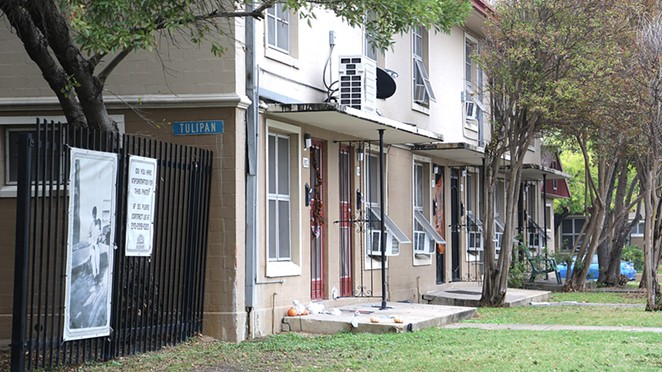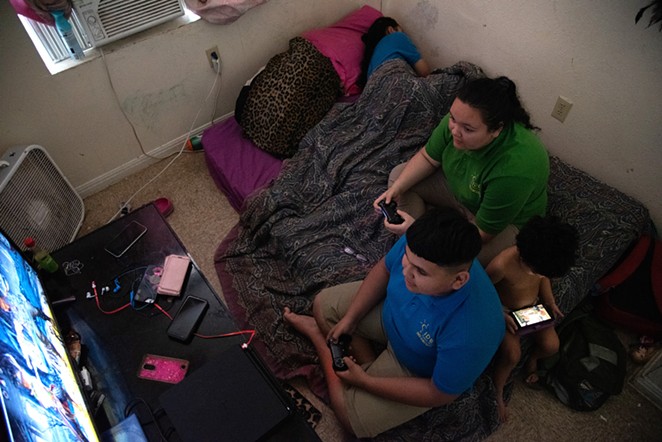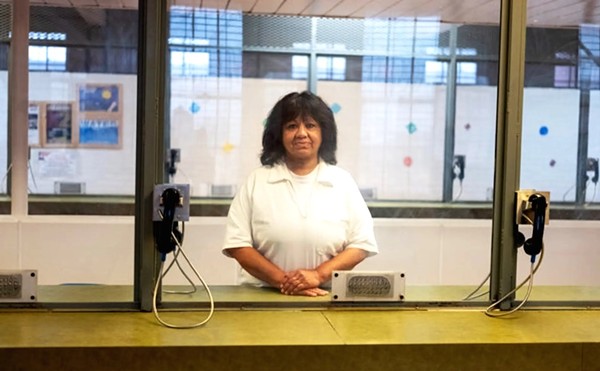The single mother of four is challenging an attempt by the San Antonio Housing Authority, or SAHA, to remove her from her Alazan-Apache Courts apartment, a “three-bedroom” the size of studios in some of the newer, city-subsidized downtown developments.
Her life is stressful enough as she shuttles her kids to and from school every day, while, in between, running her own errands and raising two-year-old nephew De’Andre, whose parents are in prison. Lately, with the threat of eviction looming over her household, Miranda squeezes in meetings with the neighborhood association that’s helping her and other Alazan-Apache residents organize against SAHA. Then there are the trips to eviction court far out on Bandera Road, and meetings with her pro bono lawyer and at state Rep. Diego Bernal’s office, which is looking into the matter.
“And nobody’s paying my gas, nobody’s helping me watch the kids, nobody’s putting in for all this extra expense,” said Miranda, 36, who’s lived at the courts for more than two years. “My kids see me down every day — tired, exhausted, frustrated. And I’m worried. If we don’t live here, where are we going to live? I can’t afford anything else.”
Miranda’s is one of several households at Alazan-Apache who accuse SAHA of harassment in the form of bogus lease violations. The infractions then snowball into what’s called a notice to vacate, the landlord’s first attempt to take back possession of the property. Last month, Miranda lost her case at eviction court and is now appealing.
David Nisivoccia, SAHA’s CEO and president, declined to address any specific case. Instead, he outlined an appeal process available to public housing residents who disagree with a lease violation or eviction. The housing authority, he said, also points residents in the direction of services to help with the cost of paying their utilities or rent. For folks who fall behind on rent or fees they owe, repayment agreements are sometimes available too, he said.
“The housing authority is in the business of housing people,” Nisivoccia said. “We don’t want to evict people. And we have certain mitigation initiatives in place to help people navigate through that system,” if tenants find themselves with mounting fees or the prospect of being evicted.
Residents agree the appeal system is a good one, but they say it’s not being followed by Alazan-Apache management or the case workers who interact with tenants. They say Nisivoccia is painting a quixotic picture of how these situations should be handled, not how they actually are.
The amount SAHA said Miranda owed — and the amount that landed her in eviction court — was $891. She says she’s been paying her rent, but this spring, SAHA began applying her payments toward a balance of fees she said she was surprised to discover she owed.
The bulk of that was for Joy, a terrier mix belonging to her ex-husband, who watches the kids sometimes. Miranda insists Joy doesn’t live there, but says she was hit with a pet fee anyway.
Dating back to this time last year, Miranda says she’s been given dozens of lease violations by SAHA for things she says she not guilty of. After appealing, some of the violations were dismissed within SAHA’s appeal system, but others stuck.
Among them were fees for basic maintenance repairs she says SAHA should handle and pay for as landlord.
As Miranda pays her monthly rent, it’s applied toward the fees, meaning she can’t keep up.
Bernal, who last year organized the donation and installation of 2,200 air conditioning units at public housing properties in San Antonio, said he’s looking into the issue. In particular, he’s exploring debt structures other housing authorities use, such as in Austin and Fort Worth, where payment of rent and fees are kept separate.
“One makes sense to me,” Bernal said of that structure. “The other — I’m not saying it’s done this way on purpose — but it feels more like a payday loan structure, where if you accumulate fees and fines, and also owe rent, that money goes to the fees and fines first before it goes to the rent.”
There have been roughly 16,000 eviction cases filed in Bexar County each of the past four years, according to research conducted by Amelia Adams, an analyst with Texas Housers, an Austin-based advocacy group. Not all of those cases, which are dispersed to the county’s four Justice of the Peace courts, resulted in an eviction. In 2018, of the 15,925 cases filed locally, 19 percent were dismissed for one reason or another. That same year, 79 percent of the cases were won by the landlords. In 57 percent of those cases, the tenant didn’t show up to court, according to Texas Housers’ research.
According to state property code, if a tenant owes back rent, no matter what the specifics of the issue are, they’re nearly guaranteed to lose the case and be slapped with an eviction on their record.
While evictions do happen, Nisivoccia said they’re low compared to the for-profit market. Last year, SAHA evicted 247 households, most of which — 177 — were for nonpayment of rent.
In San Antonio, defense options for tenants facing eviction are scarce, however.
One of those is the Texas RioGrande Legal Aid (TRGLA), an organization offering free eviction defense to tenants. Miranda was lucky enough get help from the group, and says they’re close to settling her debt with SAHA. A TRGLA spokeswoman declined comment, including to say whether it’s helping other public housing tenants.
The city of San Antonio’s anti-displacement fund has also kicked in in at least one case, 13-year resident Francisco “Pancho” Perez who lived there with his wife and three kids. The fund covered his balance of roughly $3,000.
It was Perez’s case that got the Historic Westside Resident Association involved in the first place. After getting the word out, the association, which has ties to the Esperanza Peace & Justice Center, is now helping 20 residents across eight households.
Recently, Nisivoccia reached out to the group, and the two sides could meet next week.
Ben Olivo is editor of the San Antonio Heron, a nonprofit news organization dedicated to informing its readers about the changes to downtown and the surrounding communities.
Stay on top of San Antonio news and views. Sign up for our Weekly Headlines Newsletter.




















